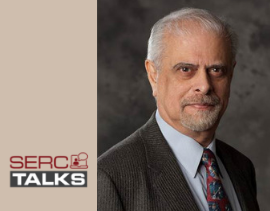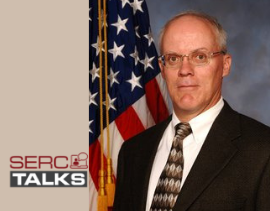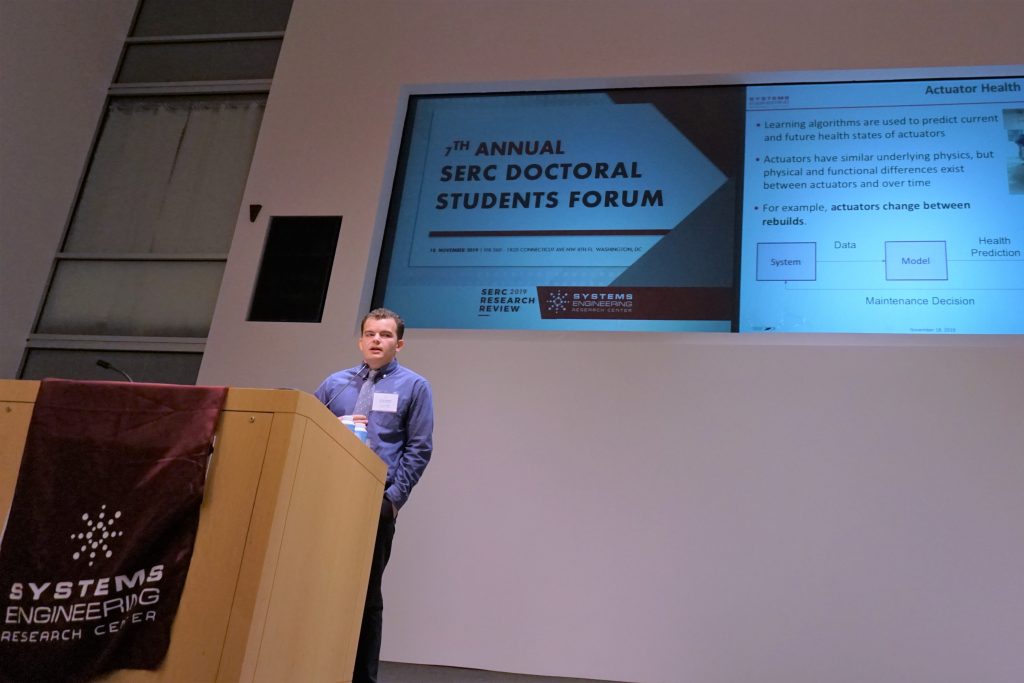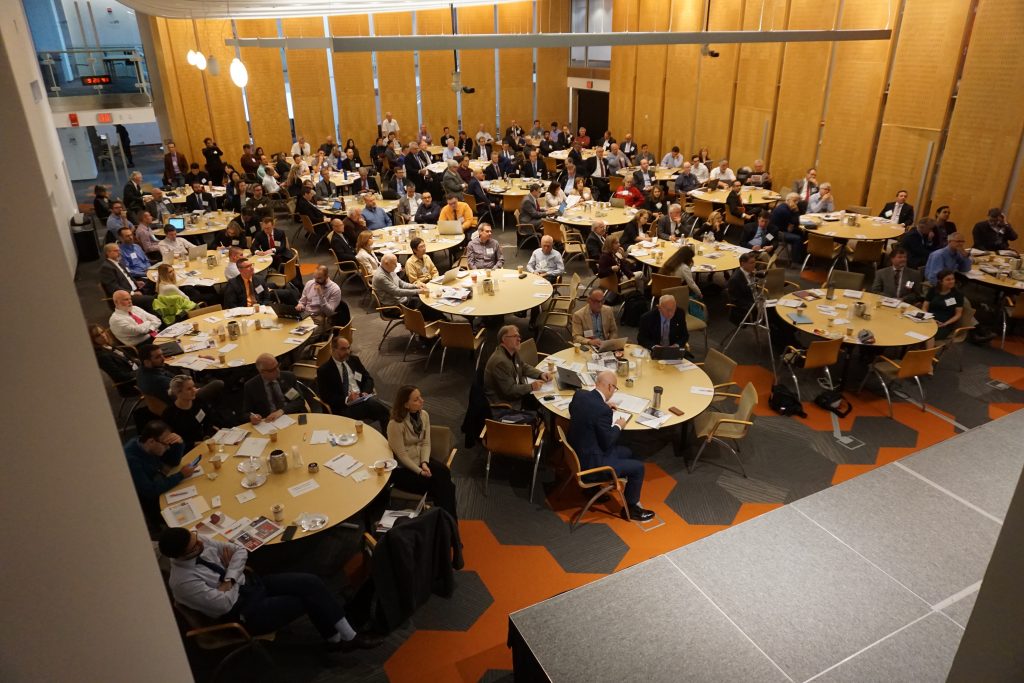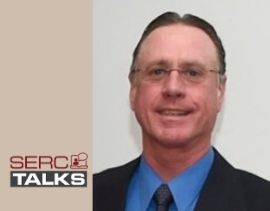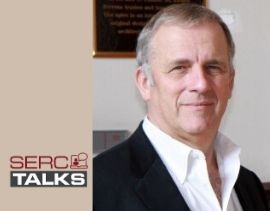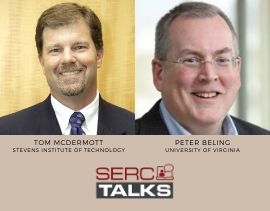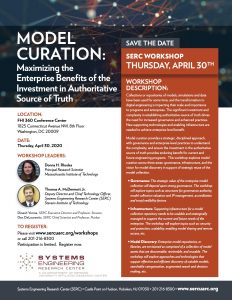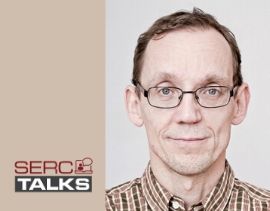
Events Search and Views Navigation
August 2019
SERC TALKS: “What’s Really Distributed in Distributed Autonomy?”
Distributed autonomy pertains to a sociotechnical system in which geographically distributed human and software agents make independent observations, pool them to jointly determine the state of the environment, and then make collaborative decisions based on their shared goals and knowledge of environment state. This Talk presents ongoing research on adaptive cyber-physical-human system, an example of intelligent distributed autonomy. The perimeter security of a parked transport aircraft using multiple surveillance quadcopters is used as an illustrative example.
Find out more »October 2019
SERC TALKS: “What is the role of a Reference Architecture in research and development of autonomous and/or cooperative systems?”
The Autonomy and Navigation Technology (ANT) Center at the Air Force Institute of Technology (AFIT) has begun development of a new Reference Architecture for Autonomy to begin to answer the myriad of needs within research, development and testing of autonomous and/or cooperative systems. This Reference Architecture will initially cater to small unmanned aerial and ground vehicles and the interfaces and operators that would be used to direct these vehicles in accomplishing tasks. The framework should be flexible to allow achievement of effective mission capabilities with autonomous and cooperative agents.
Find out more »November 2019
Systems Thinking Workshop / 7th Annual SERC Doctoral Students Forum
Held as one part of the SERC Research Review, the SERC Doctoral Students Forum (SDSF) provides an opportunity for doctoral students conducting highly relevant, systems engineering-related research at any of the SERC collaborating universities to present their research in an open forum in front of colleagues from other universities, sponsoring organizations and members of FFRDCs and industry.
Find out more »11th Annual SERC Sponsor Research Review (SSRR)
The SERC Sponsor Research Review unites the government, industry, and academic systems engineering research community in order to share research progress and discuss the most challenging systems engineering issues today. In our full two day event, of which the SERC Sponsor Research Review spans the second day, the review highlights over twenty ongoing SERC research projects. Researchers from the SERC universities discussed their research, highlighted results, and described opportunities for government agencies to sponsor and/or participate in their projects.
Find out more »December 2019
SERC TALKS: “How Can System Architecture and Cost Models be Integrated for UAS Tradespace Analysis?”
The Naval Postgraduate School and Air Force Institute of Technology have developed affordability tradeoff analysis methods employing architectural and parametric cost models applied to Unmanned Aerial Systems (UAS). A focus is at the interface of cost and architecture models for the automatic extraction of system size attributes from the architecture models at the levels of software, system and UAS domain product line. Costs can then be associated with architecture variants to assess tradeoffs between affordability and other ilities.
Cost models have been extended for integration with formal Model-Based Systems Engineering (MBSE) methods including SysML, Orthogonal Variability Modeling (OVM), discrete event simulation, and system behavioral modeling with Monterey Phoenix (MP). Relevant case studies for small UAS are continuing as the methods are being refined. Existing models were applied to demonstrate tradeoff analyses, and new models were created to better represent actual conditions empirically observed in practice.
The talk will overview the modeling methods and their interfaces, case studies applied to single system architectures, and current investigations with UAS domain reference architectures developed by AFIT.
February 2020
SERC TALKS: “How Can We Systems Engineer Trust into Increasingly Autonomous Cyber-Physical Systems?”
One of the primary inhibitors of trust in autonomous and cyber-physical systems is the likelihood that any such computer-based systems may be infiltrated and manipulated by a malicious entity. We can systems engineer trust into such systems if we start with an in-depth understanding of the mathematical structure of the hardware and software. We then can migrate the computing from register-based CPUs with operating systems to pure dataflow based networked computing. Internal self-knowledge and constraints then can be trusted to limit autonomy and to protect cyber-physical systems from operating outside of the specified physical envelope. This talk will review the mathematics and provide a perspective of networked computing for the emerging discipline of cyber-physical systems engineering.
Find out more »April 2020
SERC TALKS: “Can We Assure Resilience of Cyber-Physical Systems Using Model-Based Systems Engineering?”
This presentation will provide a history of SERC Mission Aware research, current work to standardize assurance design in MBSE tools, and a discussion of opportunities for future research. The presentation will include a demonstration of a mission aware meta-model for an example complex system-of system.
Find out more »SERC Workshop: MODEL CURATION
Maximizing the Enterprise Benefits of the Investment in Authoritative Source of Truth | This workshop explores model curation across three areas: governance, infrastructure, and the vision for model discovery in support of strategic reuse of the model collection. Workshop attendance is by invitation only. Participation is limited.
Find out more »June 2020
Protected: SERC & NUWC Talks: “” with Dr. ABC
Speaker: Dr. Martin Törngren, Professor, KTH Royal Institute of Technology | <a style="font-size: 16px;" href="mailto:ma*****@kt*.se" data-original-string="DfLv32P8/9QJSZKkr/UCcg==525Lp0QBTfEySXq2f69/OWz7c6Yy0a7yd8XqK9LIJCKhzs7Ee+Y+v2oWFCpF3kwln4o4KcTfq4x8BPPvFaK0tfwyHMf+A2slo3tPodrb3XeIbZnsqWh/gpUbsF9mSFCoxyf" title="This contact has been encoded by Anti-Spam by CleanTalk. Click to decode. To finish the decoding make sure that JavaScript is enabled in your browser.;SE*******@st*****.edu?subject=SERC Talks w/ Martin Törngren - June 3">CONTACT This Talk is free to the public and all are welcomed to join and participate in this open discussion. Slides will be up at least two hours prior to the Talk if not sooner. If you have…
Find out more »SERC TALKS: “How Do We Make Sure Future Cyber-Physical Systems Are Human Centered, and In Particular, Trustworthy?”
This talk will provide the following perspectives to H-CPS: trends and capabilities of future CPS, drawing upon lessons learnt from previous technological shifts; a complexity analysis of CPS, used to highlight bottlenecks in current (systems) engineering practices; and directions towards trustworthy and circular CPS.
Automated driving and edge computing will be taken as technological case studies for illustrative purposes.

